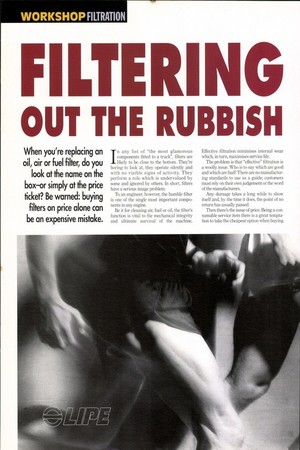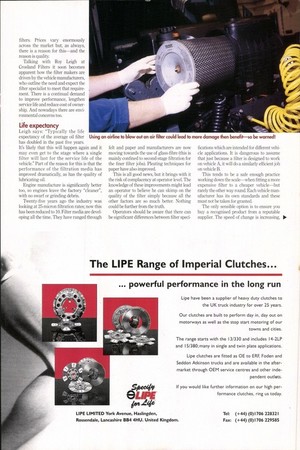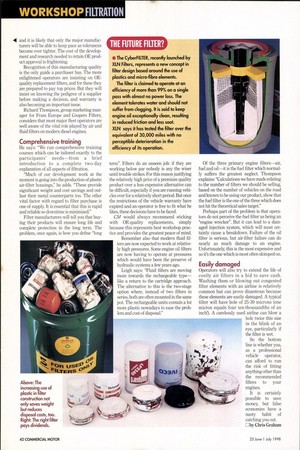I.TEllt 14IG OUT TN RUBBISH When you're replacing an oil,
Page 42

Page 43

Page 44

If you've noticed an error in this article please click here to report it so we can fix it.
air or fuel filter, do you look at the name on the box-or simply at the price ticket? Be warned: buying filters on price alone can be an expensive mistake. /n any list of "the most glamorous components fitted to a truck", filters are likely to be close to the bottom. They're boring to look at, they operate silently and with no visible signs of activity. They perform a role which is undervalued by some and ignored by others. In short, filters have a serious image problem.
To an engineer, however, the humble filter is one of the single most important components in any engine.
Be it for cleaning air, fuel or oil, the filter's function is vital to the mechanical integrity and ultimate survival of the machine. Effective filtration minimises internal wear which, in turn, maximises service life.
The problem is that "effective" filtration is a woolly issue. Who is to say which are good and which are bad? There are no manufacturing standards to use as a guide; customers must rely on their own judgement or the word of the manufacturers.
Any damage takes a long while to show itself and, by the time it does, the point of no return has usually passed.
Then there's the issue of price. Being a consumable service item there is a great temptation to take the cheapest option when buying filters. Prices vary enormously across the market but, as always, there is a reason for this—and the reason is quality.
Talking with Roy Leigh at Crosland Filters it soon becomes apparent how the filter makers are driven by the vehicle manufacturers, who outline the need and expect the filter specialist to meet that requirement. There is a continual demand to improve performance, lengthen service life and reduce cost of ownership. And nowadays there are environmental concerns too.
Life expectancy It's likely that this will happen again and it may even get to the stage where a single filter will last for the service life of the vehicle." Part of the reason for this is that the performance of the filtration media has improved dramatically, as has the quality of lubricating oil.
Engine manufacture is significantly better too, so engines leave the factory "cleaner", with no swarf or grinding debris.
Twenty-five years ago the industry was looking at 25-micron filtration rates; now this has been reduced to 10. Filter media are developing all the time. They have ranged through felt and paper and manufacturers are now moving towards the use of glass-fibre (this is mainly confined to second-stage filtration for the finer filter jobs). Pleating techniques for paper have also improved.
This is all good news, but it brings with it the risk of complacency at operator level. The knowledge of these improvements might lead an operator to believe he can skimp on the quality of the filter simply because all the other factors are so much better. Nothing could be further from the truth.
Operators should be aware that there can be significant differences between filter speci fications which are intended for different vehicle applications. It is dangerous to assume that just because a filter is designed to work on vehicle A, it will do a similarly efficient job on vehicle B.
This tends to be a safe enough practice working down the scale—when fitting a more expensive filter to a cheaper vehicle—but rarely the other way round. Each vehicle manufacturer has its own standards and these must not be taken for granted.
The only sensible option is to ensure you buy a recognised product from a reputable supplier. The speed of change is increasing, ■ and it is likely that only the major manufacturers will be able to keep pace as tolerances become ever tighter. The cost of the development and research needed to retain OE product approval is frightening.
Recognition of this manufacturing quality is the only guide a purchaser has. The more enlightened operators are insisting on ()Equality replacement filters, and for these they are prepared to pay top prices. But they will insist on knowing the pedigree of a supplier before making a decision, and warranty is also becoming an important issue.
Richard Thompson, group marketing manager for Fram Europe and Coopers Filters, considers that most major fleet operators are well aware of the vital role played by air and fluid filters on modern diesel engines.
Comprehensive training He says: "We run comprehensive training courses which can be tailored exactly to the participants' needs—from a brief introduction to a complete two-day explanation of all aspects of filtration.
"Much of our development work at the moment is going into the production of plastic air-filter housings," he adds. "These provide significant weight and cost savings and outlast their metal counterparts too. The other vital factor with regard to filter purchase is one of supply. It is essential that this is rapid and reliable so downtime is minimised."
Filter manufacturers will tell you that buying their products will ensure long life and complete protection in the long term. The problem, once again, is how you define "long term". Filters do an unseen job: if they are working below par nobody is any the wiser until trouble strikes. For this reason justifying the relatively high price of a premium quality product over a less expensive alternative can be difficult, especially if you are running vehicles over for a relatively short period. But once the restrictions of the vehicle warranty have expired and an operator is free to fit what he likes, these decisions have to be faced.
CM would always recommend sticking with OE-quality replacements, simply because this represents best workshop practice and provides the greatest peace of mind.
Remember also that modern fluid filters are now expected to work at relatively high pressures. Some engine oil filters are now having to operate at pressures which would have been the preserve of hydraulic systems a few years ago.
Leigh says: "Fluid filters are moving more towards the rechargeable type— like a return to the cartridge approach. The alternative to this is the two-stage option where, instead of two filters in series, both are often mounted in the same pot. The rechargeable units contain a lot more plastic nowadays to ease the problem and cost of disposal." Of the three primary engine filters—air, fuel and oil—it is the fuel filter which normally suffers the greatest neglect. Thompson explains: "Calculations we have made relating to the number of filters we should be selling, based on the number of vehicles on the road and known to be using our product, show that the fuel filter is the one of the three which does not hit the theoretical sales target."
Perhaps part of the problem is that operators do not perceive the fuel filter as being an "engine wrecker". But it can lead to a damaged injection system, which will most certainly cause a breakdown. Failure of the oil filter is serious, but air-filter failure can do nearly as much damage to an engine. Unfortunately, this is the most expensive and so it's the one which is most often skimped on.
Easily damaged Operators will also try to extend the life of costly air filters in a bid to save cash. Washing them or blowing out congested filter elements with an airline is relatively common but can prove disastrous because these elements are easily damaged. A typical filter will have hole of 25-30 microns (one micron equals four ten-thousandths of an inch!). A carelessly used airline can blow a hole twice this size in the blink of an eye, particularly if the filter is wet.
So the bottom line is whether you, as a professional vehicle operator, can afford to run the risk of fitting anything other than the recommended filters to your engines.
It is certainly possible to save money, but false economies have a nasty habit of catching you out. Eby Chris Graham THE FUTURE FILTER?
The CyberFILTER, recently launched by XLN Filters, represents a new concept in filter design based around the use of plastics and micro-fibre elements.
The filter is claimed to operate at an efficiency of more than 99% on a single pass with almost no power loss. The element tolerates water and should not suffer from clogging. It is said to keep engine oil exceptionally clean, resulting in reduced friction and less soot. XLN says it has tested the filter over the equivalent of 30,000 miles with no perceptible deterioration in the efficiency of its operation.
























































































































